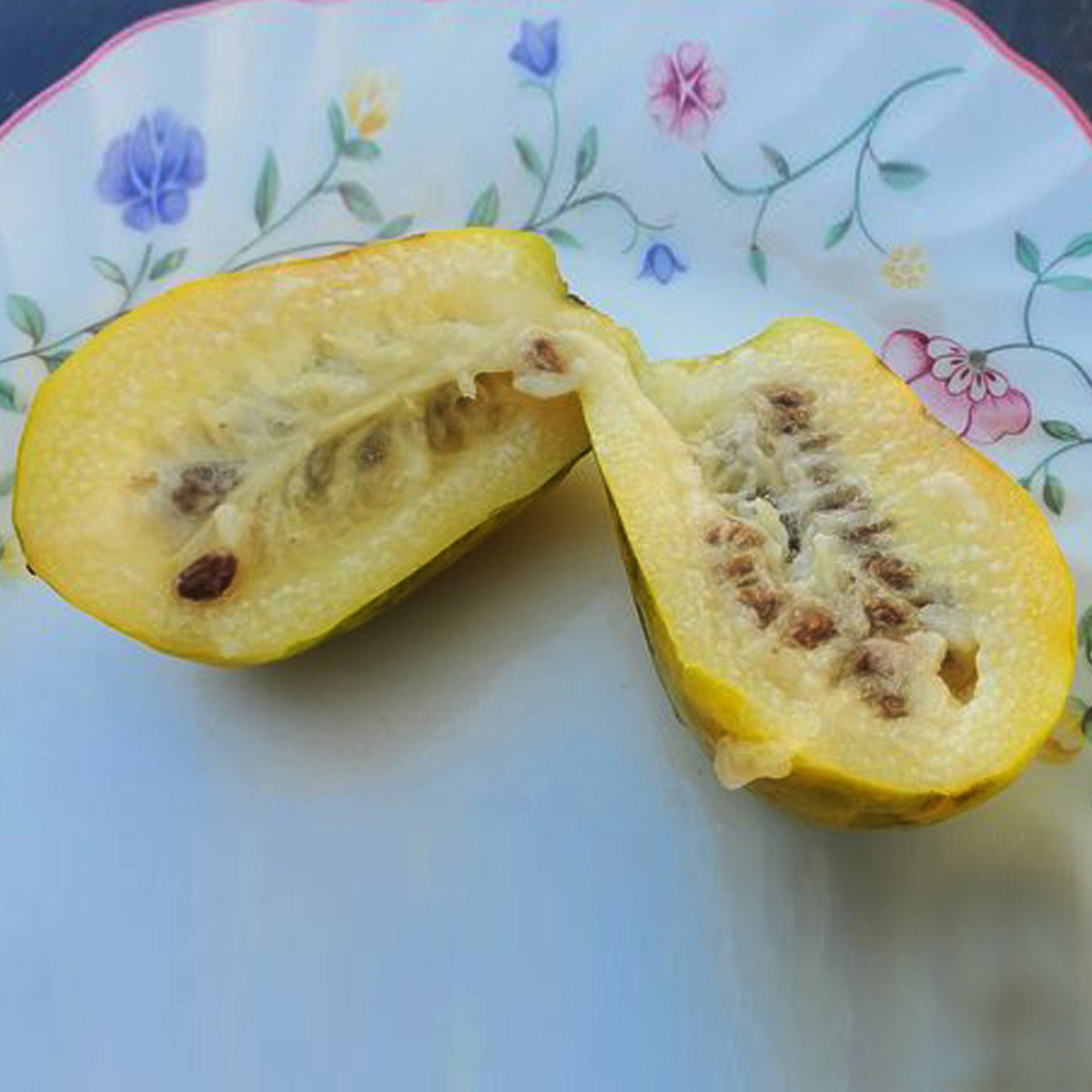Love it? Add to your wishlist
Your favorites, all in one place. Shop quickly and easily with the wishlist feature!
[message]
[title]
[message]


Veliyath Gardens
Couldn't load pickup availability
Toronche (Vasconcellea stipulata): A Rare, Refreshing Delight from the Andean Valleys
The Toronche, also known locally as Toranchi or Jigacho, is a rare and underappreciated fruit native to the Andean regions of Ecuador and Peru. Scientifically classified as Vasconcellea stipulata, this member of the Caricaceae family holds a special place among fruit lovers for its entirely edible, juicy, and refreshingly sweet fruits. With its curved trunk horns—called stipules—and eye-catching fruit, it remains one of the most prized species in the Vasconcellea genus.
Although not widely cultivated commercially, Toronche is cherished in its native regions and is believed to be one of the progenitors of the Babaco hybrid papaya, a well-known crop around the globe.
Botanical Name: Vasconcellea stipulata
Common Names: Toronche, Toranchi, Jigacho
Family: Caricaceae
Native To: Ecuador, Peru
Also Found In: Colombia and selected Andean gardens across South America
The plant is botanically fascinating due to its distinctive horn-like stipules on the trunk, which give it a striking appearance and also aid in its identification.
Plant Type: Medium-sized shrub or small tree
Height: Usually grows between 2.5 to 4 meters
Leaves: Palmate, similar to papaya leaves but more leathery and firm
Flowers: Small, creamy to yellowish, appearing in clusters
Fruits: Elongated to oval, greenish-yellow when ripe
Trunk Feature: Visible horn-like stipules—unique within its genus
Climate: Prefers highland tropical or subtropical environments
Sunlight: Thrives in partial shade to full sun
Soil: Requires well-drained, loamy soil with moderate organic content
Watering: Regular watering without waterlogging
Maintenance Level: Moderate, with occasional pruning to shape and enhance airflow
Fruit-Bearing: Begins producing fruits in 2–3 years under favorable conditions
This adaptable species is known for its resilience in mountain slopes and cool valleys, making it an ideal choice for gardeners in similar tropical climates.
Appearance: Medium-sized, elongated or oval, with smooth skin that turns yellow or pale green upon ripening
Pulp: Yellow to orange, soft and succulent
Texture: Smooth and juicy
Flavor Profile:
Mildly sweet with citrusy undertones
A gentle balance of acidity and sugar, making it refreshing
Often compared to a cross between papaya and passionfruit
Its entirely edible nature—including the soft skin—makes it a joy to eat fresh, without waste or preparation hassles.
Fresh Consumption:
Best eaten raw for maximum juiciness and flavor
Sliced and served as a refreshing fruit bowl or in tropical salads
Other Culinary Uses:
Used in making natural juices and smoothies
Blended into fruit popsicles or light sorbets
Can be added to tarts or fruit-based yoghurts for a tropical twist
Preservation Tips:
Ripe fruits can be refrigerated for 3–5 days
Pulp can be frozen for off-season use
Mildly acidic nature makes it suitable for jam and compote preparation
Toronche’s versatility in the kitchen makes it perfect for those who love experimenting with fruits that are light, healthy, and less sugary than common tropical fruits.
Though still understudied compared to commercial fruits, the Toronche is known to carry many health-promoting properties based on its fruit structure and relation to papaya species:
Rich in Enzymes – Similar to papaya, contains natural digestive enzymes that help break down proteins and ease digestion
Low in Sugar – Offers a mild sweetness suitable for low-sugar diets
Hydrating – High water content aids in hydration and cellular function
Antioxidants – Likely to contain carotenoids and vitamin C, which help in skin health and immune function
Dietary Fiber – Supports gut health and detoxification
A perfect fruit for those looking for a light, nutritious addition to their daily intake.
In Ecuadorian highlands, the fruit is appreciated as a seasonal delicacy and is often grown in home gardens for personal use
Traditionally shared within families during harvest, symbolizing abundance and purity
It is believed to have folk digestive benefits when consumed after meals, especially in rural Andean communities
As one of the ancestors of Babaco, its legacy continues in hybrid fruits cultivated commercially around the world
Though not commonly found in global markets, it holds cultural importance in the regions where it naturally thrives.
Rare and Exotic – A collector’s delight for those passionate about uncommon fruits
Low Maintenance – Adapts well to various tropical environments with modest care
Beautiful and Productive – Doubles as an ornamental tree with its horned trunk and bold leaves
Entirely Edible – No waste; skin and pulp can be consumed
Naturally Healthy – Low-calorie, enzyme-rich, and hydrating
Adding Toronche to your fruit garden not only enhances the biodiversity of your space but also introduces a touch of Andean authenticity and wholesome eating.
The Toronche fruit, with its crisp freshness, edible skin, and rich lineage, is more than just a rare fruit—it’s an experience. Whether you’re drawn by its ornamental charm or intrigued by its healthy, refreshing flavor, this Andean treasure is a natural fit for those seeking something genuinely different.
At Veliyath Gardens, we’re proud to offer this exotic plant, opening a door to a world of lesser-known fruits that bring both tradition and taste into your garden. Let the Toronche thrive in your care and become part of your tropical journey toward healthy, unique living.
Climate: Prefers highland tropical or subtropical environments
Sunlight: Thrives in partial shade to full sun
Soil: Requires well-drained, loamy soil with moderate organic content
Watering: Regular watering without waterlogging
Rich in Enzymes – Similar to papaya, contains natural digestive enzymes that help break down proteins and ease digestion
Low in Sugar – Offers a mild sweetness suitable for low-sugar diets
Hydrating – High water content aids in hydration and cellular function
Rare and Exotic – A collector’s delight for those passionate about uncommon fruits
Low Maintenance – Adapts well to various tropical environments with modest care
Beautiful and Productive – Doubles as an ornamental tree with its horned trunk and bold leaves



